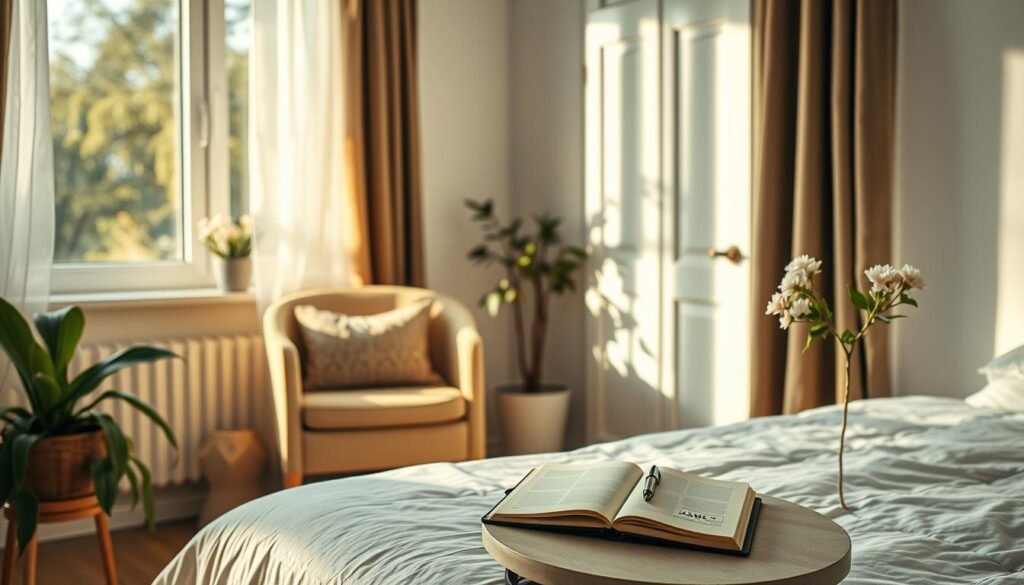About 60% of people with anxiety disorders say they feel very tired all the time. This shows a big need for ways to handle this kind of fatigue. Managing this fatigue is key to feeling better and getting back the energy that seems lost. Anxiety can make you very tired mentally and emotionally. It can also mess up how well you sleep and how you get through the day. But, you can fight this fatigue by understanding where it comes from. By using some easy strategies, people can start to feel less tired.
Key Takeaways
- Managing fatigue from anxiety is essential for reclaiming energy levels.
- Anxiety-induced tiredness can lead to chronic fatigue and disrupted sleep.
- Simple strategies can help combat fatigue caused by anxiety.
- Establishing a consistent routine is vital for improving mental health.
- Relaxation techniques and mindfulness practices can alleviate anxiety symptoms.
- A balanced diet and regular exercise support overall wellness.
Understanding Anxiety-Induced Tiredness
Anxiety-induced tiredness affects many but is not well understood. It’s more than just feeling worn out. It hits our minds and bodies hard. When we’re anxious, our bodies are on high alert. This sends us into a cycle of tiredness that’s tough to escape. Knowing more about this fatigue helps us manage it better.
What is Anxiety-Induced Tiredness?
This kind of tiredness comes from long-term anxiety. When we’re highly anxious, our bodies react. This is the “fight or flight” response. It can make us feel worn out, tense, and foggy. Up to 30% of Americans will deal with anxiety at some point. That’s why it’s important to recognize and understand this issue.
How Anxiety Affects Your Energy Levels
Anxiety uses up a lot of our mental and physical energy. This constant alert state can lead to big crashes of fatigue. Anxiety also messes with our sleep, which makes the exhaustion worse. Bad sleep, muscle tension, and feeling mentally drained can make normal tasks hard.
Persistent fatigue might lead us to bad habits, like staying still too long or sleeping poorly. Anxiety-filled thoughts drain our mental focus and energy. Figuring out the root causes of this fatigue is key. By doing so, we can work towards feeling energized again and improving our lives.
| Factor | Impact on Energy Levels |
|---|---|
| Anxiety | Triggers fight-or-flight response, causing exhaustion |
| Poor Sleep | Decreases overall energy and increases fatigue |
| Muscle Tension | Contributes to physical tiredness and discomfort |
| Mental Fatigue | Impairs cognitive functioning and leads to exhaustion |
| Coping Mechanisms | May prolong fatigue and disrupt daily routines |
Identifying the Symptoms of Fatigue from Anxiety
It’s key to know the signs of fatigue caused by anxiety. These signs come in different forms. Knowing them helps in getting the right support.
Common Signs of Anxiety-Related Fatigue
Symptoms of this fatigue include:
- Persistent tiredness even after sleeping well
- Lack of motivation for daily tasks
- Irritability and mood changes
- Difficulty concentrating or making choices
- Sleep disturbances like insomnia or too much sleep
Women often feel more fatigued than men, showing possible gender differences. Stress can make it worse. It’s important to know what triggers your anxiety.
Distinguishing Fatigue from Other Conditions
Knowing the difference between anxiety fatigue and other conditions is crucial. Chronic fatigue syndrome has similar signs but different causes. To understand, keep in mind:
| Condition | Symptoms | Notable Characteristics |
|---|---|---|
| Anxiety-Related Fatigue | Persistent tiredness, irritability, no motivation | Often due to stress and anxiety |
| Chronic Fatigue Syndrome | Lasting fatigue, restless sleep, trouble thinking | Fatigue lasts 6 months or more |
| Depression | Lack of energy, less interest, sleep changes | Mood affects energy a lot |
If you’re feeling very tired and rest doesn’t help, see a healthcare provider. Finding the actual cause means getting the right treatment to feel better.

Managing Fatigue from Anxiety: Simple Strategies
Dealing with fatigue from anxiety means finding ways to get your energy back. Having a steady daily routine is key. Adding physical activity helps a lot in overcoming fatigue caused by anxiety.
Importance of a Balanced Routine
To create a balanced routine, plan your day with time for work, rest, and fun. This helps avoid feeling too stressed, which can make you more tired. A good plan includes:
- Setting specific times for work and relaxation
- Incorporating breaks throughout the day
- Engaging in enjoyable hobbies
- Ensuring adequate sleep
Handling fatigue this way gives you control and makes life more predictable. It also helps lower your anxiety.
Incorporating Physical Activity Effectively
Physical activity is key to fighting fatigue from anxiety. Regular exercise lifts your energy and improves your mental health. Good activities include:
- Walking for at least 15 minutes daily
- Stretching exercises
- Gentle yoga classes
These help improve your mood and lessen anxiety. A lifestyle that includes exercise supports a balanced routine.
Using these strategies is important in dealing with fatigue from anxiety. A balanced routine with physical activity improves energy and mental sharpness.
Nutrition and Its Role in Combating Anxiety-Induced Tiredness
Nutrition is key in fighting anxiety-induced tiredness. Making smart food choices greatly affects our well-being. Energy-boosting foods are vital for sustained energy and mental health support.
Food Choices that Boost Energy Levels
Eating a balanced diet can majorly boost your energy. Eating regularly and choosing healthy snacks are important. They keep energy up all day. Eating different food groups gives the body needed nutrients. This helps fight fatigue from anxiety. Great energy-boosting foods include:
- Whole grains – Brown rice and quinoa offer energy that lasts longer.
- Fruits – Bananas and berries give vitamins and quick energy.
- Nuts and seeds – Almonds and chia seeds are good for fullness and energy.
- Lean proteins – Chicken, fish, and legumes help repair the body, boosting energy.
Hydration: A Key Factor
Staying hydrated is crucial. Not drinking enough can make you tired and anxious. Drinking water helps keep up energy and brain power. A hydrated body processes nutrients better. This improves mood and energy. To beat fatigue, try these hydration tips:
- Drink at least eight 8-ounce glasses of water each day.
- Add hydrating foods to your diet, like cucumbers and watermelon.
- Check your urine color; pale yellow means you’re well-hydrated.
Making smart food and hydration choices really helps with anxiety-related fatigue. Focusing on nutrition and drinking plenty of water can boost your energy and clarity of mind.

| Food Group | Benefits |
|---|---|
| Whole Grains | Provide sustained energy with complex carbohydrates. |
| Fruits | Offer vitamins and quick energy from natural sugars. |
| Nuts and Seeds | Deliver healthy fats and protein for long-lasting energy. |
| Lean Proteins | Support muscle repair and overall well-being. |
| Water | Essential for hydration and optimal body function. |
The Importance of Sleep in Reducing Fatigue from Anxiety
Sleep plays a key role in handling anxiety and boosting well-being. For many, better sleep quality and anxiety levels are closely linked. Getting enough rest can greatly improve your energy and lessen anxiety fatigue. Here are easy tips for restful sleep for daily life.
Tips for Improving Sleep Quality
It’s important to have a regular sleep schedule. Sleeping and waking at the same times every day aids your body’s clock. Also, a calming bedtime routine tells your brain it’s time to relax. To better sleep quality and anxiety, follow these steps:
- Avoid screens an hour before sleep to cut down on blue light.
- Curb caffeine use in the afternoon and evening.
- Add calming activities like yoga or meditation to your routine.
- Ensure your sleep space is dark and cool.
- Try writing in a journal to calm your thoughts before bed.
Creating a Restful Sleep Environment
Making a good sleep setting is crucial for reducing fatigue from anxiety. Here are important tips:
| Factor | Best Practices |
|---|---|
| Light | Use blackout curtains or an eye mask to keep it dark. |
| Noise | A white noise machine or earplugs can help keep it quiet. |
| Temperature | Keep your room cool, around 60-67°F (15-19°C). |
| Comfort | Choose a good mattress and pillows for your sleep style. |
| Air Quality | Air purifiers can lessen sleep-disrupting allergens. |
In summary, improving sleep quality and anxiety levels is key for health. The right sleep strategies and setting support rest and lessen reducing fatigue from anxiety. Keeping up these habits and seeking advice when needed can make a big difference. For more on helping adrenal health, check out this resource.
Coping with Exhaustion from Anxiety
Feeling tired because of anxiety is tough. Finding ways to feel better is important. You can revive your energy and calmness. Relaxation methods are key for this. Practices like yoga, tai chi, and hobbies help lower stress. They make you feel better overall. Learning to use these can greatly improve your life.
Techniques for Relaxation and Stress Relief
There are many ways to relax and ease anxiety’s impact. These methods improve your day-to-day life:
- Yoga: It mixes postures, breathing, and meditation. This refreshes and relaxes you.
- Tai Chi: Its slow moves build mindfulness and ease stress. It’s great for dealing with anxiety.
- Engaging in Hobbies: Doing things like painting or playing music shifts your focus. It brings joy and a sense of success.
Mindfulness Practices for Anxiety Management
Adding mindfulness to your daily life affects your anxiety. It helps by making you focus on the now. Being kind to your thoughts is part of it. Here are some ways:
- Meditation: Spending time each day to focus on breathing clears your mind. It lessens anxiety.
- Mindful Walking: Focus on every step and how it feels connects you to your body.
- Deep Breathing Exercises: Deep, slow breaths help you relax and lower tension.
Overcoming anxiety tiredness is possible with relaxation and mindfulness. These approaches boost your ability to handle anxiety. They lead to more energy and a more balanced life.

| Relaxation Techniques | Benefits |
|---|---|
| Yoga | Makes you more flexible, eases stress, and sharpens focus. |
| Tai Chi | Improves balance, lessens anxiety, and raises energy. |
| Hobbies | Offers a creative escape, lifts your mood, and fosters friendships. |
| Meditation | Boosts awareness of self, cuts down stress, and enhances concentration. |
| Mindful Walking | Increases exercise, brings peace, and builds mindfulness. |
| Deep Breathing | Relaxes you, decreases stress hormones, and soothes your nerves. |
Developing a Support System for Energy Depletion from Anxiety
Creating a strong support system for anxiety-related fatigue is key. It helps in managing energy loss. Emotional support from family and friends can create a safe place. Here, people can share their experiences and feelings, which helps their overall well-being.
When people close to you understand your anxiety struggles, they offer empathy and comfort. This makes facing daily challenges a bit easier.
The Role of Family and Friends
Support from family is crucial for those fighting anxiety. Talking openly, sharing daily issues, and just being there helps reduce loneliness. Family’s encouragement can push one to adopt healthy habits. This can range from practicing mindfulness to engaging in positive activities.
They also play a key role in reminding one of the importance of seeking professional help when needed. This ensures no one has to struggle on their own.
When to Seek Professional Help
Getting professional help becomes critical when anxiety starts to take over your life. Symptoms like ongoing tiredness, mood swings, or trouble focusing signal the need for more help. Counseling and therapy provide ways to deal with anxiety-driven exhaustion.
Making the decision to seek professional advice is a powerful step. It helps in taking back control of your mental health and energy levels.
| Support Type | Benefits |
|---|---|
| Family Support | Lowers feelings of isolation, boosts morale, encourages healthy habits |
| Friend Support | Provides companionship, shared experiences, emotional relief |
| Professional Help | Access to expert knowledge, tailored coping strategies, therapeutic techniques |
Fatigue Relief Techniques for Anxiety
Anxiety can really tire you out. It makes you feel weak. But you can fight this by using certain methods. Techniques that improve your energy focus on exercise and chilling out.
Physical Activities That Replenish Energy
Physical activities can fight off the tiredness anxiety brings. Moving your body is key. Things like walking or stretching make a real difference. The Centers for Disease Control and suggest moving around for at least 150 minutes every week. Just a short 15-minute walk can lift your spirits and energy. Mixing up your routine with yoga or more intense exercises is great for your body and mind.
Simple Breathing Exercises
Breathing right can help you relax and reduce anxiety. Deep breaths center your mind, helping you focus and stress less. Making this a habit can help you feel more at peace. This, plus eating regularly and sleeping well, fights off tiredness linked to anxiety. Stick with it, and you’ll likely feel way less tired over time.
Overcoming Tiredness Due to Anxiety with Lifestyle Changes
Anxiety can make you feel very tired. It’s important to make some lifestyle changes. Time management and cutting down on caffeine and alcohol can help a lot. These changes can give you more energy and improve how you feel overall.
Implementing Effective Time Management
Good time management means making a daily plan. This plan should balance work and fun. It can stop you from feeling too stressed and help you think clearly. A good schedule lessens stress. It makes you more productive and gives you time for yourself.
- Establish priorities by identifying critical tasks for the day.
- Break larger tasks into smaller, manageable chunks.
- Incorporate regular breaks to recharge throughout the day.
- Set realistic deadlines to minimize pressure.
Limiting Caffeine and Alcohol Intake
Cutting down on caffeine and alcohol is key for beating tiredness from anxiety. These substances can mess up your sleep and make you more irritable. Too much caffeine can even make anxiety worse. Drinking less caffeine and alcohol can improve your sleep and energy.
| Substance | Effects on Anxiety | Recommended Limit |
|---|---|---|
| Caffeine | Can increase anxiety levels and disrupt sleep | Less than 400 mg/day (about 4 cups of brewed coffee) |
| Alcohol | May affect sleep quality and contribute to fatigue | Moderation (up to 1 drink/day for women, 2 for men) |
Making these lifestyle changes can help you feel more awake and improve your life quality. By organizing your time well and being careful with caffeine and alcohol, you can reduce tiredness from anxiety.
Conclusion
Managing fatigue from anxiety requires a well-rounded plan. It’s key to understand how this tiredness affects our work, family, and social lives. Using various strategies like changing our lifestyle and diet helps us get our energy back and feel better.
Healthy habits are very important. Getting enough sleep, exercising regularly, and eating well help fight off fatigue. Working closely with doctors is also vital. They help diagnose any health issues and create effective treatment plans. Learning about anxiety disorders can lead to better ways to deal with them.
To beat fatigue, we must look at both the physical and mental sides. Those dealing with long-term fatigue should look into resources for a thorough evaluation, like this research. Understanding and applying these methods can lead us to a healthier, more balanced life.